________________
XI KÂNDA, I ADHYÂYA, 7 BRAHMANA, 4.
21
consecrated to the Fathers'; and if he does eat he eats whilst passing over the gods ;' and, in this respect, they lay down the rule, 'Let him therefore eat what grows in the forest.'
2. If he eats cultivated plants he eats the sacrificial essence of the offering-cake ; and if he eats forest plants he eats the essence of the barhisa; and if he eats aught of trees he eats the essence of the fuel (for the sacrificial fire); and if he drinks milk he consumes the essence of the Sannayya 8; and if he drinks water he consumes the essence of the lustral waters * ; and if he eats nothing he becomes consecrated to the Fathers.
3. As to this they say, 'What course of procedure is there?' Well, let him, on those two nights (of full and new moon), himself offer the Agnihotra : inasmuch as, after offering, he takes food he does not become consecrated to the Fathers, for that (libation) is an offering; and inasmuch as he performs that offering in his own self he does not eat of those sacrificial essences.
4. Now all the nights concentrate themselves in these two nights: all the nights of the waxing moon concentrate in the night of full moon, and all the nights of the waning moon concentrate in the night of new moon; and, verily, for him who, knowing this, offers (the Agnihotra) himself on the day of
That is, he would be liable to die, and join the departed ancestors.
• The layer of sacrificial grass spread on the Vedi, serving as a seat for the deities to whom offering is made.
. For this dish, prepared of sweet and sour milk, and offered at the New-moon sacrifice, see part i, p. 178, note 4.
• For the Pranitåh, see I, 1, 1, 12.
Digitized by
Digitized by Google




